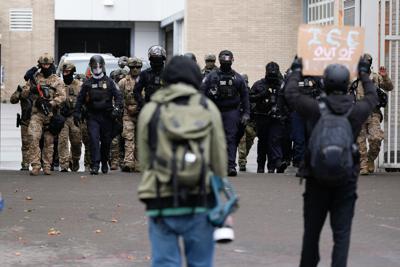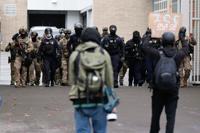PORTLAND, Ore. (AP) — A federal judge in Oregon ruled Friday that President Donald Trump’s administration failed to meet the legal requirements for deploying the National Guard to Portland after the city and state sued in September to block the deployment.
The ruling from U.S. District Court Judge Karin Immergut, a Trump appointee, followed a three-day trial last week in which both sides argued over whether protests at the city’s U.S. Immigration and Customs Enforcement building met the conditions for using the military domestically under federal law. The administration said the troops were needed to protect federal personnel and property.
In a 106-page opinion, Immergut found that even though the president is entitled to “great deference” in his decision on whether to call up the Guard, he did not have a legal basis for doing so because he did not establish that there was a rebellion or danger of rebellion, or that he was unable to enforce the law with regular forces.
The White House didn’t immediately respond to a request for comment.
Democratic cities targeted by Trump for military involvement — including Chicago, which has filed a separate lawsuit on the issue — have been pushing back. They argue the president has not satisfied the legal threshold for deploying troops and that doing so would violate states’ sovereignty.
Immergut issued two orders in early October that had blocked the deployment of the troops leading up to the trial. She previously found that Trump had failed to show he had met the legal requirements for mobilizing the National Guard. She described his assessment of Portland, which Trump has called “war-ravaged” with “fires all over the place,” as “simply untethered to the facts.”
The 9th U.S. Circuit Court of Appeals has already ordered that the troops not be deployed pending further action by the appeals court. The trial Immergut held further developed the factual record in the case, which could serve as the basis for further appellate rulings.
Witnesses including local police and federal officials were questioned about the law enforcement response to the nightly protests at the city’s ICE building. The demonstrations peaked in June, when Portland police declared one a riot. The demonstrations typically drew a couple dozen people in the weeks leading up to Trump’s National Guard announcement.
The Trump administration said it has had to shuffle federal agents from elsewhere around the country to respond to the Portland protests, which it has characterized as a “rebellion” or “danger of rebellion.”
Federal officials working in the region testified about staffing shortages and requests for more personnel that have yet to be fulfilled. Among them was an official with the Federal Protective Service, the agency within the Department of Homeland Security that provides security at federal buildings, whom the judge allowed to be sworn in as a witness under his initials, R.C., because of safety concerns.
R.C., who said he would be one of the most knowledgeable people in DHS about security at Portland’s ICE building, testified that a troop deployment would alleviate the strain on staff. When cross-examined, however, he said he did not request troops and that he was not consulted on the matter by Homeland Security Secretary Kristi Noem or Trump. He also said he was “surprised” to learn about the deployment and that he did not agree with statements about Portland burning down.
Attorneys for Portland and Oregon said city police have been able to respond to the protests. After the police department declared a riot on June 14, it changed its strategy to direct officers to intervene when person and property crime occurs, and crowd numbers have largely diminished since the end of that month, police officials testified.
Another Federal Protective Service official who the judge also allowed to testify under his initials said protesters have at times been violent, damaged the facility and acted aggressively toward officers working at the building.
The ICE building closed for three weeks over the summer because of property damage, according to court documents and testimony. The regional field office director for ICE’s Enforcement and Removal Operations, Cammilla Wamsley, said her employees worked from another building during that period. The plaintiffs argued that was evidence that they were able to continue their work functions.
Oregon senior assistant attorney general Scott Kennedy said that “without minimizing or condoning offensive expressions” or certain instances of criminal conduct, “none of these incidents suggest ... that there’s a rebellion or an inability to execute the laws.”
Johnson reported from Seattle. Associated Press staff writer Michelle L. Price in Palm Beach, Florida, contributed to this report.







